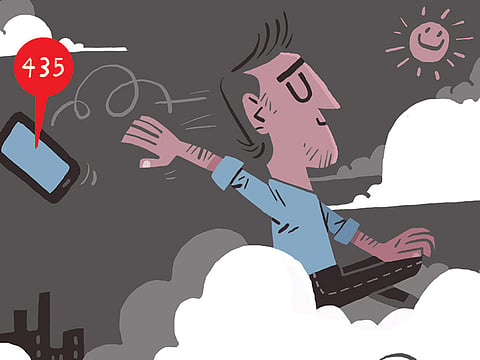Rediscovering life after social media
I suddenly won back more than ten hours of my day that I had spent online. I find more time to exercise and I find more time to read.

I honestly didn’t think I can do it. To be able to quit, cold turkey, and not in phases, social media which was a part of my life for an entire decade, was unfathomable to me. The idea of taking a break crept up in my mind sometime towards the end of 2016 and by New Year’s eve I had posted “My new year’s resolution is to quit social media in 2017.” I must admit the messages I received from followers asking me to reconsider were heartwarming but I was doing this for me.
I had decided in my mind that I would do so after my teaching stint at New York University in the US. For some reason I felt that I needed to document that time of my life. And I was right, New York City in April 2017 was the greatest month of myself and I was glad to share it with others. But all things come to an end and by early June 2017 I had finally quit both Facebook and Twitter. I suddenly won back more than ten hours of my day that I had spent online, reading comments by this person and deleting comments by another. My decision was aided by the increasingly polarised social media environment that followed the Gulf crisis and a series of recent cybercrime legislations in the region that I was happy to avoid.
A number of factors bothered me more than anything online. First I did not feel I had control over my online presence. A conversation was never truly over, it was just dormant until someone else decided to post (an insidious) comment that bothered me for days on end. At one point in time a person who had taken over a late Ugandan friend’s Facebook account went on a vendetta of creating hundreds of fake profiles purporting to be me and while Facebook team was very helpful it exemplified for me the nastiness that can find its way online. On Twitter a conversation was never truly muted or blocked. Vile comments by people I wanted to avoid would find their way into my feed. It was like eavesdropping on every nasty conversation someone on Planet Earth was having about you (hopefully they’re not too many).
Product of the platform
Today, several months on, I find more time to exercise and I find more time to read. Most importantly and surprisingly for me as I had not expected this, I find more time to think. The pace of life had slowed down significantly. A big challenge with social media for me was the immediacy of everything. “Tell me your opinion NOW of so and so that happened a mere five minutes ago.” The pressure was building up and frankly it wasn’t worth it. I hope I find a way to go back to social media one day but I am absolutely in no rush. I realised that with the 80,000 Facebook followers and the 500,000 Twitter followers (many of whom are no doubt bots) I myself had become the product of the platform. I provided entertainment and shared knowledge that hopefully was useful to others.
It’s only fair to give social media its due credit. These platforms are like any other product, one can use them for good while a loud minority uses them for cruelty. I know people who met on my own Facebook page and got married while countless friendships were developed and entrepreneurship possibilities that circumvent Arab governments’ bureaucracy flourished. It was also at one point in time a great platform for free speech and exchange of ideas perhaps until 2013 or so for me at least.
Another benefit is that social media is great tool for research. As late as last year when I was doing research for a book on the modern architecture of Sharjah I posted a query about an individual and an Egyptian follower almost instantly wrote me saying, “That’s my uncle, here’s their number.” This is the power of social media. It’s a giant that if one cannot effectively manage to use it then they best distance themselves from it. And I am not ashamed to admit that I got overwhelmed and decided to take a long sojourn away from it. It turns out that the scenario of too much of a good thing is actually real.
Today I am active on Instagram and less so on Snapchat posting mostly about architecture, arts and exercise but I do hope to migrate away from both platforms in the not too distant future. To quote Emirati author Aisha Taryam who went through a similar experience, one ought to “disconnect from the masses and reconnect with yourself”. I had realised that while I was online, I missed me and I was happy to be re-acquainted.
Sultan Sooud Al Qassemi is a UAE-based writer.



